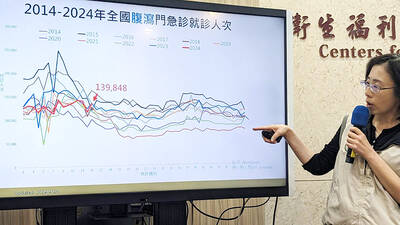A Facebook post by a US student who talked about his experience of receiving high-quality, low-cost medical care in Taiwan has gone viral and has been picked up by the Washington Post.
Kevin Bozeat, 25, who is studying in Taiwan, related how efficiently he was treated when he went to the emergency room of a Taiwanese hospital with severe gastrointestinal symptoms.
“I was immediately checkedin by an English-speaking nurse,” Bozeat wrote on Feb. 17 in a post titled “Went to the ER in Taiwan.”
“Within 20 minutes I was given IV fluids and anti-emetics. They took blood tests and did an ultrasound to ensure it wasn’t gall stones or appendicitis. From there I was given a diagnosis: a particularly severe case of Acute Viral Gastroenteritis (aka the stomach flu),” he wrote.
He said he was later discharged with a prescription for anti-emetics and pain medication, and was back to normal after a few days.
The total bill for the hospital visit and medication was US$80, Bozeat said, adding that if he had National Health Insurance (NHI) coverage it would have been less.
“This could have easily cost me hundreds or even thousands in the US without insurance. But here in Taiwan I was able to receive speedy, quality care comparable to what I would have gotten in a US hospital for relatively small amount of money,” Bozeat wrote. “Given this experience, I no longer have a reason to fear or hesitate getting care in Taiwan should I ever need it.”
His post has since gained more than 120,000 likes on Facebook and has been shared 210,000 times. It was also referenced in a Washington Post report on Feb. 28 that mentioned Taiwan’s health insurance system amid intensifying debates about healthcare in the US.
In a follow-up post on Feb. 24, Bozeat said he wanted to make a clarifying statement in response to some of the comments on his first post.
“This system exists because the Taiwanese government believes that healthcare is a right for all of its citizens, rather than a privilege for those who can afford it,” he wrote, citing a Ministry of Health and Welfare English-language brochure.
The Washington Post, citing a report released last month by the journal Health Affairs, said about 6.1 percent of Taiwan’s GDP was spent on healthcare in 2017, whereas the US spent about 17.2 percent of its GDP on healthcare during the same period.

FLU SEASON: Twenty-six severe cases were reported from Tuesday last week to Monday, including a seven-year-old girl diagnosed with influenza-associated encephalopathy Nearly 140,000 people sought medical assistance for diarrhea last week, the Centers for Disease Control (CDC) said on Tuesday. From April 7 to Saturday last week, 139,848 people sought medical help for diarrhea-related illness, a 15.7 percent increase from last week’s 120,868 reports, CDC Epidemic Intelligence Center Deputy Director Lee Chia-lin (李佳琳) said. The number of people who reported diarrhea-related illness last week was the fourth highest in the same time period over the past decade, Lee said. Over the past four weeks, 203 mass illness cases had been reported, nearly four times higher than the 54 cases documented in the same period

A group of Taiwanese-American and Tibetan-American students at Harvard University on Saturday disrupted Chinese Ambassador to the US Xie Feng’s (謝鋒) speech at the school, accusing him of being responsible for numerous human rights violations. Four students — two Taiwanese Americans and two from Tibet — held up banners inside a conference hall where Xie was delivering a speech at the opening ceremony of the Harvard Kennedy School China Conference 2024. In a video clip provided by the Coalition of Students Resisting the CCP (Chinese Communist Party), Taiwanese-American Cosette Wu (吳亭樺) and Tibetan-American Tsering Yangchen are seen holding banners that together read:

Heat advisories were in effect for nine administrative regions yesterday afternoon as warm southwesterly winds pushed temperatures above 38°C in parts of southern Taiwan, the Central Weather Administration (CWA) said. As of 3:30pm yesterday, Tainan’s Yujing District (玉井) had recorded the day’s highest temperature of 39.7°C, though the measurement will not be included in Taiwan’s official heat records since Yujing is an automatic rather than manually operated weather station, the CWA said. Highs recorded in other areas were 38.7°C in Kaohsiung’s Neimen District (內門), 38.2°C in Chiayi City and 38.1°C in Pingtung’s Sandimen Township (三地門), CWA data showed. The spell of scorching

UNAWARE: Many people sit for long hours every day and eat unhealthy foods, putting them at greater risk of developing one of the ‘three highs,’ an expert said More than 30 percent of adults aged 40 or older who underwent a government-funded health exam were unaware they had at least one of the “three highs” — high blood pressure, high blood lipids or high blood sugar, the Health Promotion Administration (HPA) said yesterday. Among adults aged 40 or older who said they did not have any of the “three highs” before taking the health exam, more than 30 percent were found to have at least one of them, Adult Preventive Health Examination Service data from 2022 showed. People with long-term medical conditions such as hypertension or diabetes usually do not